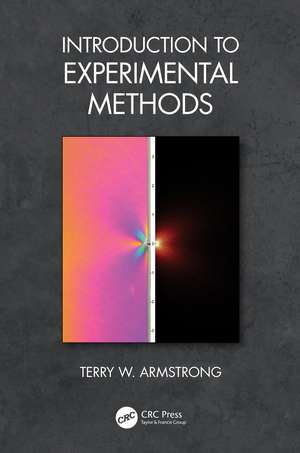Introduction to Experimental Methods
Autor Terry W. Armstrongen Limba Engleză Hardback – 31 iul 2023
Offering a complete overview of instruction for engineering lab methodology, the book includes practical lab manuals for student use, directly complementing the instruction. Numerous worked examples and problems are presented along with several hands-on experiments in individual lab manuals. This book discusses how to write lab reports, how to configure a variety of instruments and equipment, and how to work through failures in experimentation.
Introduction to Experimental Methods is intended for senior undergraduate engineering students taking courses in Experimental Methods. Instructors will be able to utilize a Solutions Manual for their course.
Features:
- Provides an overview of experimental methods in mechanics, dynamics, heat transfer, and fluid dynamics
- Covers design of experiments, instruments, and statistics
- Discusses SolidWorks and PASCO Capstone software
- Includes numerous end-of-chapter problems and worked problems
- Features a Solutions Manual for instructor use
Preț: 851.75 lei
Preț vechi: 1038.72 lei
-18% Nou
Puncte Express: 1278
Preț estimativ în valută:
162.98€ • 170.62$ • 134.86£
162.98€ • 170.62$ • 134.86£
Carte tipărită la comandă
Livrare economică 05-19 aprilie
Preluare comenzi: 021 569.72.76
Specificații
ISBN-13: 9781032358932
ISBN-10: 1032358939
Pagini: 488
Ilustrații: 84 Tables, black and white; 190 Line drawings, black and white; 1 Halftones, black and white; 191 Illustrations, black and white
Dimensiuni: 156 x 234 x 27 mm
Greutate: 0.88 kg
Ediția:1
Editura: CRC Press
Colecția CRC Press
ISBN-10: 1032358939
Pagini: 488
Ilustrații: 84 Tables, black and white; 190 Line drawings, black and white; 1 Halftones, black and white; 191 Illustrations, black and white
Dimensiuni: 156 x 234 x 27 mm
Greutate: 0.88 kg
Ediția:1
Editura: CRC Press
Colecția CRC Press
Public țintă
Academic and Undergraduate AdvancedCuprins
Preface; Author; About the Cover; 1. Approach to Experimentation. 2. The Team. 3. Deliverables. 4. Design of Experiments. 5. Sample Size. 6. Managing Experimental Errors. 7. System Modeling and First-Order Systems. 8. Discrete Vibrations and Second-Order Systems. 9. Continuous System Vibrations. 10. Waves. 11. Stress and Strain. 12. Photoelasticity. 13. Fractures. 14. Non-Destructive Inspection. 15. Instruments and Sensors. 16. Analyzing Data Sets. 17. Evaluating the Hypothesis. 18. Virtual Experiments. 19. Unexpected Results. 20. Reporting Numbers. 21. Active Writing. 22. Presentations. Lab Manuals. Appendices. Index.
Notă biografică
Dr. Terry W. Armstrong served as an Assistant Professor of Mechanical and Aerospace Engineering at New Mexico State University. He developed and taught courses in Experimental Methods I (mechanics), Experimental Methods II (heat transfer and fluid mechanics), Aerospace Systems Engineering, Engineering Analysis (advanced engineering mathematics), Thermodynamics, Dynamics, and he created a new lab-based engineering calculus course. Dr. Armstrong holds a PhD in Aerospace Engineering from New Mexico State University, a master’s degree in Aeronautical Science from Embry-Riddle Aeronautical University, and a bachelor’s degree in Engineering Science from the United States Air Force Academy. His teaching awards include the Mechanical and Aerospace Academy Outstanding Teaching Professor, Donald C. Roush Award for Teaching Excellence and Frank Bromilow Engineering Teaching Excellence.
Prior to university instruction, Lt. Colonel Armstrong served 21 years in the US Air Force, first as a T-38 instructor and then as an F-15C combat pilot and instructor pilot. Lt. Colonel Armstrong led combat missions over Iraq during Operation SOUTHERN WATCH with 150 combat flight hours. His duties have included command of Detachment 1, 85th Test and Evaluation Squadron, Tyndall AFB, FL, Chief of Flight Safety, USAFE, Ramstein AB, Germany, and Director of Special Test programs at Kirtland AFB, NM, before retiring in 2006. Lt. Colonel Armstrong holds several aviation top gun awards, distinguished graduate awards, flight instructor awards, and his service medals include the Air Medal and Aerial Achievement Medals. “How much better to get wisdom than gold; to get insight rather than silver!” (Proverbs 16:16)
Prior to university instruction, Lt. Colonel Armstrong served 21 years in the US Air Force, first as a T-38 instructor and then as an F-15C combat pilot and instructor pilot. Lt. Colonel Armstrong led combat missions over Iraq during Operation SOUTHERN WATCH with 150 combat flight hours. His duties have included command of Detachment 1, 85th Test and Evaluation Squadron, Tyndall AFB, FL, Chief of Flight Safety, USAFE, Ramstein AB, Germany, and Director of Special Test programs at Kirtland AFB, NM, before retiring in 2006. Lt. Colonel Armstrong holds several aviation top gun awards, distinguished graduate awards, flight instructor awards, and his service medals include the Air Medal and Aerial Achievement Medals. “How much better to get wisdom than gold; to get insight rather than silver!” (Proverbs 16:16)
Descriere
Introduction to Experimental Methods succinctly explains fundamental engineering concepts in mechanics, dynamics, heat transfer, and fluid dynamics. From conceptualizing an engineering experiment to presenting the results with lab experiments, this book enables students to work through the design process and analyze experimental results.
